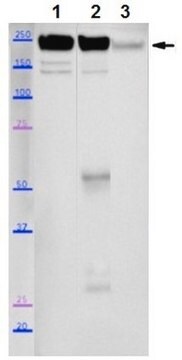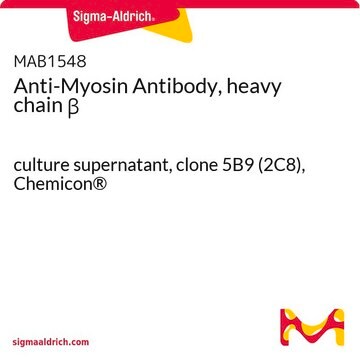MABT838
Anti-Myosin 7 (MYH7) Antibody, clone BA-D5
clone BA-D5, from mouse
Sinónimos:
Myosin heavy chain 7, Myosin heavy chain slow isoform, MyHC-slow, Myosin heavy chain, Cardiac muscle beta isoform, MyHC-beta)
About This Item
Productos recomendados
biological source
mouse
antibody form
purified immunoglobulin
antibody product type
primary antibodies
clone
BA-D5, monoclonal
species reactivity
human, mouse
packaging
antibody small pack of 25 μg
technique(s)
immunofluorescence: suitable
immunohistochemistry: suitable
western blot: suitable
isotype
IgG2bκ
NCBI accession no.
UniProt accession no.
target post-translational modification
unmodified
Gene Information
human ... MYH7(4625)
General description
Specificity
Immunogen
Application
Western Blotting Analysis: A representative lot detected Myosin 7 (MYH7) in Western Blotting applications (De Jong, A., et. al. (2017). PLoS One. 12(3):e0174043; Gan, Z., et. al. (2013). J Clin Invest. 123(6):2564-75).
Immunofluorescence Analysis: A representative lot detected Myosin 7 (MYH7) in Immunofluorescence applications (Gan, Z., et. al. (2013). J Clin Invest. 123(6):2564-75; Pannerec, A., et. al. (2016). Aging (Albany NY). 8(4):712-29).
Cell Structure
Quality
Western Blotting Analysis: 4 µg/mL of this antibody detected Myosin 7 (MYH7) in mouse soleus muscle tissue lysate.
Target description
Physical form
Storage and Stability
Other Notes
Disclaimer
¿No encuentra el producto adecuado?
Pruebe nuestro Herramienta de selección de productos.
Storage Class
12 - Non Combustible Liquids
wgk_germany
WGK 1
flash_point_f
Not applicable
flash_point_c
Not applicable
Certificados de análisis (COA)
Busque Certificados de análisis (COA) introduciendo el número de lote del producto. Los números de lote se encuentran en la etiqueta del producto después de las palabras «Lot» o «Batch»
¿Ya tiene este producto?
Encuentre la documentación para los productos que ha comprado recientemente en la Biblioteca de documentos.
Nuestro equipo de científicos tiene experiencia en todas las áreas de investigación: Ciencias de la vida, Ciencia de los materiales, Síntesis química, Cromatografía, Analítica y muchas otras.
Póngase en contacto con el Servicio técnico








